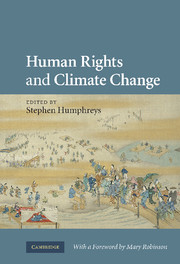Book contents
- Frontmatter
- Contents
- Authors' biographies
- Acronyms
- Acknowledgements
- Foreword
- Introduction: human rights and climate change
- PART I Rights perspectives on global warming
- 1 Competing claims: human rights and climate harms
- 2 Climate change, human rights and moral thresholds
- 3 Equitable utilization of the atmosphere: a rights-based approach to climate change?
- 4 Climate change, human rights and corporate accountability
- 5 Rethinking human rights: the impact of climate change on the dominant discourse
- PART II Priorities, risks and inequities in global responses
- Conclusion
- Appendix: climate change impacts on human rights
- Index
5 - Rethinking human rights: the impact of climate change on the dominant discourse
from PART I - Rights perspectives on global warming
Published online by Cambridge University Press: 04 August 2010
- Frontmatter
- Contents
- Authors' biographies
- Acronyms
- Acknowledgements
- Foreword
- Introduction: human rights and climate change
- PART I Rights perspectives on global warming
- 1 Competing claims: human rights and climate harms
- 2 Climate change, human rights and moral thresholds
- 3 Equitable utilization of the atmosphere: a rights-based approach to climate change?
- 4 Climate change, human rights and corporate accountability
- 5 Rethinking human rights: the impact of climate change on the dominant discourse
- PART II Priorities, risks and inequities in global responses
- Conclusion
- Appendix: climate change impacts on human rights
- Index
Summary
In times of crisis it is necessary to think imaginatively, provocatively and radically as orthodoxies collapse around us, and to distinguish common sense from good sense. Who would have thought that the ‘credit crunch’ crisis would so rapidly and thoroughly destabilise the dogmas of neoliberalism, and provoke the re-emergence of nationalisation and regulation and a rediscovered role for the state? Every crisis is potentially also an opportunity. The unsustainability of capitalist globalisation has long been apparent to those on the receiving end, who will yet again bear the costs of bailing out the corporate culprits, as it has been to the environment. Indeed, finding solutions to both crises must involve a fundamental restructuring of global governance.
This chapter challenges certain shibboleths in the dominant human rights discourse and the efficacy of prevailing ideas about governance and markets in combating anthropogenic global warming. In particular, it examines the viability of market-based solutions, in which human rights rarely feature – much as if the two sets of principles existed in different domains. It raises disconcerting issues, for example, whether the right to a sustainable environment should, to echo Hannah Arendt, become a new principle of humanity that takes precedence over other rights. Perhaps paradoxically, the chapter nonetheless assumes that human rights provide an important means of addressing climate change, either through the construction of a new overarching or meta-right to a sustainable environment or by deploying existing rights.
- Type
- Chapter
- Information
- Human Rights and Climate Change , pp. 159 - 180Publisher: Cambridge University PressPrint publication year: 2009
- 4
- Cited by



